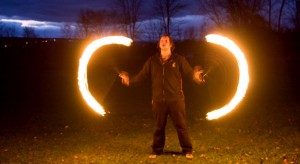For most people, any hobby that would sacrifice a dreadlock would cease to exist on their list of favorite things to do. But one dreadlock-less sophomore Zack Turner still loves to play with fire.

“I was spinning out in the woods, and I looked over and saw that my dread caught on fire,” he said. “You catch on fire every once in awhile. That’s always a rush.”
Turner and his friends, junior Todd Aldrich and senior Dana Miraglia, practice fire spinning, an art form that originated in the Philippines, Southeast Asia and the Pacific Islands. Classified as a “flow art,” fire spinning is a broad category of artistic performances that use fire.
Turner and Aldrich perform fire poi, a practice that was started by indigenous people in New Zealand and later spread to beach resorts and party scenes as a tourist attraction. Poi consists of two chains with a Kevlar wick on each end.
The performer dips the wicks into fuel, squeezes out the excess liquid and then lights the wicks on fire, spinning them around to create dazzling patterns and mesmerizing shadows.
Turner said he first spun fire three years ago while on a trip with a Buddhist Caravan in India after watching a friend in a fire tribe perform. He said after he was handed the chains, his nerves left him little room for creativity.
“It was this huge roar of fire on both sides of me,” he said. “I was doing the most basic moves. I pretty much made two big circles the entire time. It was intimidating, but it was so invigorating that I knew I had to do it again.”
Since then, Turner has brought the art form to Ithaca College and the city and has spun with ICircus and at 2009’s Apple Festival on The Commons. This year the group performed at Earthdance 2010.
Aldrich said Turner sparked his interest in poi after he saw him perform at a party last winter. He spun for the first time in the spring of last year.
“The first time I spun fire, I probably had a few too many drinks,” he said. “Zack handed the poi to me, and I twirled them around a little bit. He lent me a practice pair for awhile, and when I decided I wanted to continue learning, I bought my own pair online.”
Aldrich said spinning is not as difficult as it looks.
“It’s not a big learning curve,” he said. “At first a pattern may seem impossible, but after a week or so of practicing, it’s automatic. It’s more of being aware of how the poi are moving and learning how your body has to move in relation.”
Aldrich’s roommate, sophomore Devin Castaldi-Micca, said he enjoys watching Aldrich spin because of the aesthetics involved in the art.
“It’s really neat to watch,” he said. “It creates these really cool patterns. It’s just entertaining to watch.”
While Miraglia has practiced poi, her specialty is in fire hooping, another type of fire spinning. Fire hooping uses a hula-hoop with 6- to 7-inch metal rods along the outer rim, resembling a wheel with protruding spokes.
While Miraglia is proficient at hooping, she said the skill took time to acquire.
“I couldn’t even hula-hoop in the fall of last year,” she said. “A couple months later, I got really into it, and I was able to do all sorts of tricks. I watched a lot of videos on YouTube of hula-hoopers, and when I learned about fire hooping I knew I had to try it.”
Miraglia said her fear of hooping with fire is what encouraged her to try it.
“I like to try things that I’m afraid of,” she said. “Life is not a spectator sport.”
Aldrich said the three take safety precautions every time they spin. They use rubber gloves to squeeze the extra fuel out of the Kevlar wicks, spin off the remaining fuel before lighting up and keep a spotter nearby with a wet towel to extinguish fires. The group also wears tight-fitted clothing and avoids using artificial products in their hair that could catch on fire.
Aldrich said besides taking precautions, the key to avoiding accidents is to remain confident while spinning.
“You have to respect the fact that it’s dangerous,” he said. “At the same time, you can’t be scared of it. Otherwise you’ll overthink it. That’s when it becomes more dangerous.”
Aldrich knows firsthand the dangers of the art. He said in addition to having no hair left on his forearms, a Halloween performance at a Cornell University friend’s party left him scrambling to extinguish a fire that had ignited his back in flames.
“I didn’t get all the fuel off my right poi, and when I did a move behind my back, it sprayed along the back of my T-shirt,” he said. “It just lit up. It had been raining, so I lay down on the ground and snuffed it out.”
Aldrich, Turner and Miraglia spin almost daily in driveways and backyards. Aldrich said the group would like to show their skills to a wider audience.
“We’ve talked about starting a school club or getting a larger community involved,” he said. “We’d love for people to ask us to spin at their parties. For us, it’s not a way to make money. It’s a hobby.”
Turner said the trance of spinning is what keeps him passionate about the art.
“The best part is getting into the fluid motion and not even realizing what you’re doing,” he said. “Once you realize to let go of the definition of what you’re trying to do, it gets much easier and more fun.”




